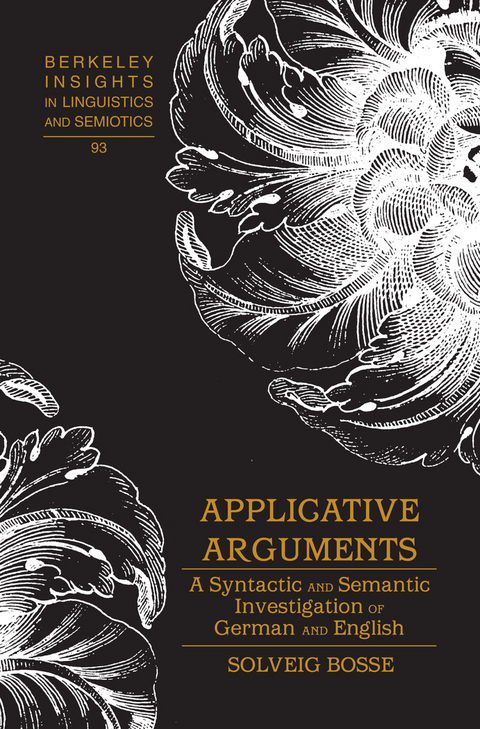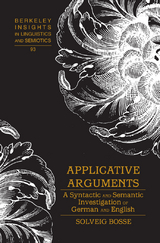Applicative Arguments
A Syntactic and Semantic Investigation of German and English
Seiten
2015
|
New edition
Peter Lang Publishing Inc (Verlag)
978-1-4331-2726-7 (ISBN)
Peter Lang Publishing Inc (Verlag)
978-1-4331-2726-7 (ISBN)
Applicative Arguments: A Syntactic and Semantic Investigation of German and English presents formal semantic and syntactic analyses of German and English applicative arguments. Both German and English have several types of applicative arguments, including so-called benefactive and malefactive constructions.
Applicative Arguments: A Syntactic and Semantic Investigation of German and English presents formal semantic and syntactic analyses of German and English applicative arguments. These arguments are nominal elements that are not obligatory parts of a sentence. Both German and English have several types of applicative arguments, including so-called benefactive and malefactive constructions. More specifically, the research relies on tests to differentiate the different types of applicative arguments based on this contribution to meaning: Some applicatives contribute only not-at-issue meaning, whereas others contribute only at-issue meaning, and still others contribute both types of meaning. These tests are applied to both German and English to uniquely identify the applicative arguments in each language. Formal analyses of the identified type of applicative arguments are presented that provide an account for each type of applicative identified for each language, explaining the applicatives’ differences and similarities.
Applicative Arguments: A Syntactic and Semantic Investigation of German and English presents formal semantic and syntactic analyses of German and English applicative arguments. These arguments are nominal elements that are not obligatory parts of a sentence. Both German and English have several types of applicative arguments, including so-called benefactive and malefactive constructions. More specifically, the research relies on tests to differentiate the different types of applicative arguments based on this contribution to meaning: Some applicatives contribute only not-at-issue meaning, whereas others contribute only at-issue meaning, and still others contribute both types of meaning. These tests are applied to both German and English to uniquely identify the applicative arguments in each language. Formal analyses of the identified type of applicative arguments are presented that provide an account for each type of applicative identified for each language, explaining the applicatives’ differences and similarities.
Solveig Bosse received her PhD in linguistics from the University of Delaware. She is currently Assistant Professor of Theoretical Linguistics in the Department of English at East Carolina University. Her research focuses on syntactic and formal semantic analyses of German and English with occasional other cross-linguistic comparisons.
Content: Preliminaries – Affected Experiencers – Not-At-Issue Applicative Arguments – Benefactives – Part-Whole Applicatives.
| Erscheint lt. Verlag | 25.3.2015 |
|---|---|
| Reihe/Serie | Berkeley Insights in Linguistics and Semiotics ; 93 | Berkeley Insights in Linguistics and Semiotics ; 93 |
| Mitarbeit |
Herausgeber (Serie): Irmengard Rauch |
| Verlagsort | New York |
| Sprache | englisch |
| Maße | 155 x 230 mm |
| Gewicht | 450 g |
| Themenwelt | Schulbuch / Wörterbuch ► Wörterbuch / Fremdsprachen |
| Geisteswissenschaften ► Philosophie ► Sprachphilosophie | |
| Geisteswissenschaften ► Sprach- / Literaturwissenschaft ► Sprachwissenschaft | |
| ISBN-10 | 1-4331-2726-1 / 1433127261 |
| ISBN-13 | 978-1-4331-2726-7 / 9781433127267 |
| Zustand | Neuware |
| Haben Sie eine Frage zum Produkt? |
Mehr entdecken
aus dem Bereich
aus dem Bereich
Macht und Legitimität politischer Sprache im Prozess der europäischen …
Buch | Softcover (2023)
Nomos (Verlag)
CHF 103,60
Wie die Menschheit zu ihrer größten Erfindung kam
Buch | Softcover (2022)
C.H.Beck (Verlag)
CHF 25,20




